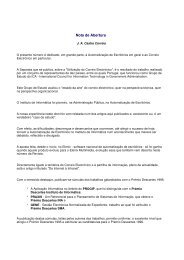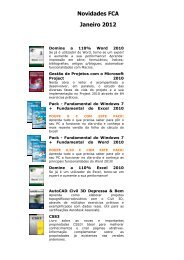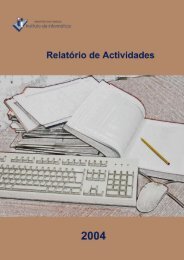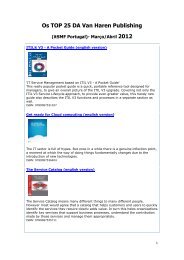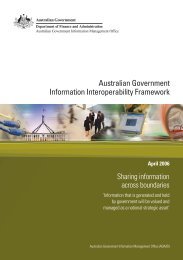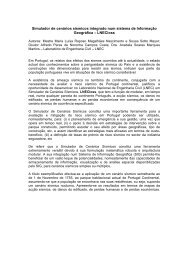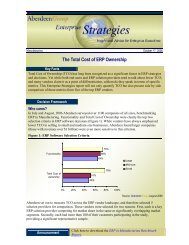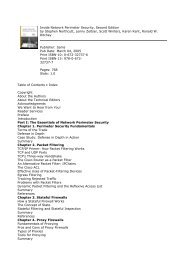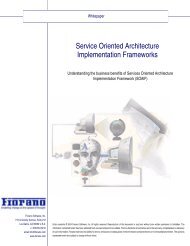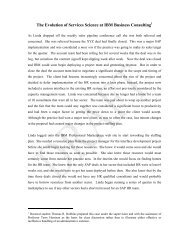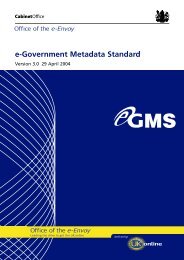OECD Peer Review of E-Government in Denmark - ePractice.eu
OECD Peer Review of E-Government in Denmark - ePractice.eu
OECD Peer Review of E-Government in Denmark - ePractice.eu
Create successful ePaper yourself
Turn your PDF publications into a flip-book with our unique Google optimized e-Paper software.
Key po<strong>in</strong>t 4.1<br />
The Danish e-government strategy identifies and responds to a number <strong>of</strong> external pressures on the public<br />
sector, challeng<strong>in</strong>g government organisations to realise the <strong>in</strong>herent potential <strong>of</strong> e-government and the positive<br />
social and technological environment that surrounds it.<br />
<strong>Government</strong> organisations have responded positively to both the need for e-government and to the e-government<br />
strategy. Most organisations regard e-government as an important priority. A majority <strong>of</strong> organisations view the<br />
e-government strategy and some <strong>of</strong> its key <strong>in</strong>itiatives as major drivers <strong>of</strong> their own e-government efforts.<br />
While the goals <strong>of</strong> the strategy reflect the policy issues that make up the bus<strong>in</strong>ess case for e-government, the<br />
design <strong>of</strong> the goals <strong>of</strong> the strategy show some bias towards public sector modernisation and efficiency issues.<br />
This is reflected <strong>in</strong> the way that government organisations are respond<strong>in</strong>g to the strategy. While this focus on<br />
efficiency is positive, it is important that other goals <strong>of</strong> e-government are also acknowledged as major drivers <strong>of</strong><br />
e-government.<br />
Political leadership <strong>of</strong> e-government<br />
In itself, e-government has never been a top-level priority or “headl<strong>in</strong>e” policy for the Danish<br />
<strong>Government</strong>. Instead, e-government has always been positioned as an enabler <strong>of</strong> other major policies –<br />
particularly those related to development <strong>of</strong> the Danish <strong>in</strong>formation society and public sector<br />
modernisation (see Chapter 2). In l<strong>in</strong>e with both this position<strong>in</strong>g <strong>of</strong> e-government with<strong>in</strong> the wider<br />
context <strong>of</strong> government policies and bus<strong>in</strong>ess, and the relatively <strong>in</strong>formal Danish approach to<br />
management <strong>of</strong> the executive, there has never been a special committee <strong>of</strong> m<strong>in</strong>isters established to<br />
play an e-government leadership, co-ord<strong>in</strong>ation or oversight role.<br />
Instead, leadership and co-ord<strong>in</strong>ation <strong>of</strong> e-government across all levels <strong>of</strong> government is the<br />
responsibility <strong>of</strong> the senior government <strong>of</strong>ficials who make up the Jo<strong>in</strong>t Board <strong>of</strong> e-<strong>Government</strong>.<br />
E-government matters requir<strong>in</strong>g m<strong>in</strong>isterial <strong>in</strong>volvement are put to the <strong>Government</strong> F<strong>in</strong>ance<br />
Committee, which is chaired by the M<strong>in</strong>ister <strong>of</strong> F<strong>in</strong>ance and meets weekly to focus on co-ord<strong>in</strong>ation<br />
<strong>of</strong> economic policy and government expenditure issues. Occasionally, the <strong>Government</strong> Co-ord<strong>in</strong>ation<br />
Committee, which is chaired by the Prime M<strong>in</strong>ister, may also become <strong>in</strong>volved.<br />
Box 4.2 Top-level co-ord<strong>in</strong>ation <strong>of</strong> e-government by <strong>Government</strong> Committees<br />
The <strong>Government</strong> F<strong>in</strong>ance Committee plays an important role <strong>in</strong> co-ord<strong>in</strong>at<strong>in</strong>g e-government. E-government<br />
matters that must be dealt with by m<strong>in</strong>isters are usually put to the Committee, due to the fact that responsibility for<br />
the Danish e-government strategy is held by the Permanent Secretary <strong>of</strong> the M<strong>in</strong>istry <strong>of</strong> F<strong>in</strong>ance. Occasionally,<br />
matters will be put before both the F<strong>in</strong>ance and the <strong>Government</strong> Co-ord<strong>in</strong>ation committees, two recent examples<br />
be<strong>in</strong>g ratification <strong>of</strong> the e-government strategy and approval <strong>of</strong> plans for the eDay <strong>in</strong>itiatives. In this way,<br />
e-government <strong>in</strong>itiatives developed at the adm<strong>in</strong>istrative level under the oversight <strong>of</strong> relevant portfolio m<strong>in</strong>isters<br />
can ga<strong>in</strong> top-level m<strong>in</strong>isterial attention and/or endorsement, as necessary.<br />
There is a strong l<strong>in</strong>k between the Jo<strong>in</strong>t Board <strong>of</strong> e-<strong>Government</strong> and the F<strong>in</strong>ance Committee. Along with the<br />
M<strong>in</strong>ister <strong>of</strong> F<strong>in</strong>ance, the M<strong>in</strong>isters <strong>of</strong> Interior and Health, and Economic and Bus<strong>in</strong>ess Affairs are members <strong>of</strong> the<br />
Committee. The Jo<strong>in</strong>t Board <strong>of</strong> e-<strong>Government</strong> is chaired by the Permanent Secretary <strong>of</strong> the M<strong>in</strong>istry <strong>of</strong> F<strong>in</strong>ance<br />
and <strong>in</strong>cludes among its members the permanent secretaries <strong>of</strong> the m<strong>in</strong>istries <strong>of</strong> Interior and Health, and Economic<br />
and Bus<strong>in</strong>ess Affairs. Aside from the direct relationship that the permanent secretaries have with their respective<br />
m<strong>in</strong>isters, which allows for discussion <strong>of</strong> e-government as required, the permanent secretaries are also <strong>in</strong>volved<br />
<strong>in</strong> preparation <strong>of</strong> the F<strong>in</strong>ance Committee agenda. This enables the Jo<strong>in</strong>t Board to both put e-government matters<br />
on the F<strong>in</strong>ance Committee agenda and/or identify agenda items that have e-government implications.<br />
Besides m<strong>in</strong>isterial back<strong>in</strong>g for e-government via these two committees, the bulk <strong>of</strong> political<br />
leadership <strong>of</strong> e-government is exercised by <strong>in</strong>dividual m<strong>in</strong>isters act<strong>in</strong>g <strong>in</strong> relation to their own<br />
portfolio responsibilities. No convention <strong>of</strong> collective m<strong>in</strong>isterial responsibility exists <strong>in</strong> Danish<br />
government, and there has been no move to establish a specific e-government portfolio. M<strong>in</strong>isters’<br />
71



